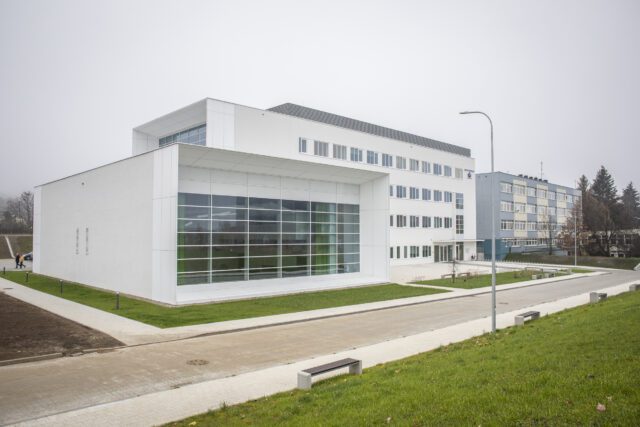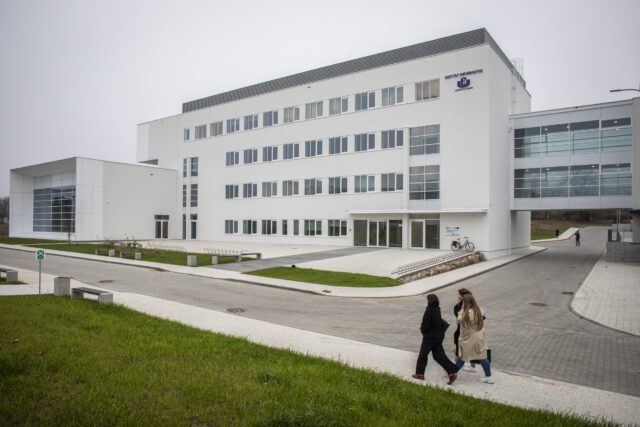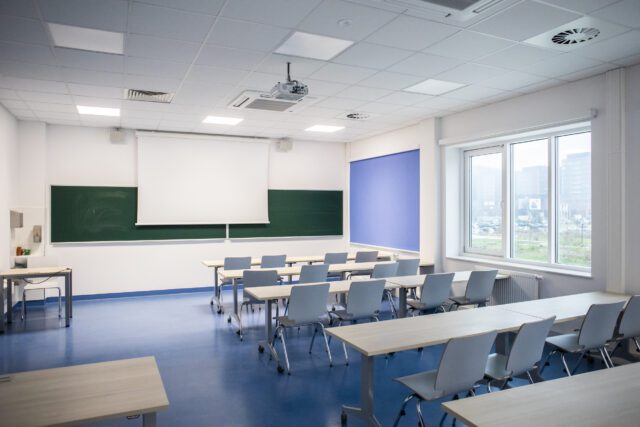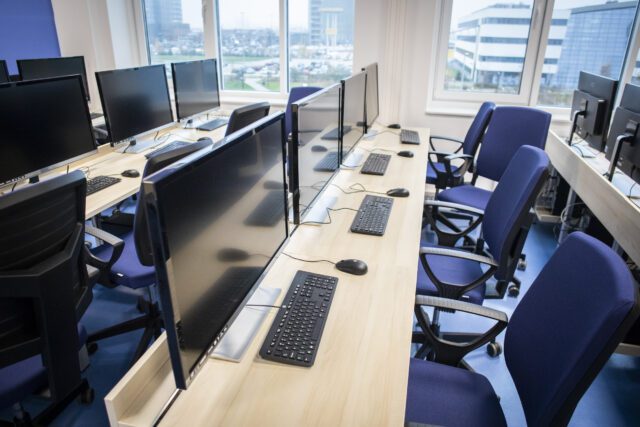Building expansion of the Department of Mathematics, Physics and Information Technology of the University of Gdańsk
Project Information
| Project Title | Building expansion of the Department of Mathematics, Physics and Informatics of the University of Gdańsk for the purposes of teaching a course with a practical orientation |
|---|---|
| Beneficiary | University of Gdańsk |
| Program | Regional Operational Programme of the Pomorskie Voivodeship for the years 2014-2020 |
| EU Funding Source | European Regional Development Fund |
| Realization Place | Gdańsk |
| Overall Value | 39 949 801,59 PLN |
| EU Funding | 21 388 706,99 PLN |
Project Description
The building of the Institute of Informatics was constructed as a part of the project „Building expansion of the Faculty of Mathematics, Physics and Informatics of the University of Gdansk for the needs of education in the field of practical profile”. The investment is a response to the needs of the labour market in the area of employment of IT specialists.
It is one of the most modern buildings in Poland, equipped with intelligent solutions, also in the field of ecology, adapted to conduct teaching in the 21st century.
The building has large auditoriums, seminar and computer rooms, teaching and research rooms, office and social rooms. The teaching rooms have been equipped with high-performance computers and audio-visual equipment. The building is also equipped with a computing cluster, which opens up to students the possibility of modern education in areas such as cloud technologies or artificial intelligence.
The building is used by students of a new field of study – Informatics with a practical profile. The modern program of these studies is the result of the experience of the teaching staff of the Institute and the result of many years of cooperation and consultation with the business environment of the IT sector, with which the Faculty maintains very good, substantive contacts. The curriculum of the studies is jointly and constantly developed.
These studies combine the theoretical basis with the learning of modern programming languages and the latest technologies and solutions related to the creation of modern applications. Some classes, from the first year of study, have been run by experienced specialists from Tri-City IT companies employing programmers.
The value of investment is over € 8,7 m. UG received funding under the Regional Operational Programme of the Pomorskie Voivodeship 2014 – 2020 in the amount of over € 4,7 m., the remaining part is the university’s own contribution. The project partner is Kainos Software Poland Ltd.
The project implementation is a response to the identified competency shortages of employees, the existing labor market needs and deficiencies in the university’s infrastructure. The key objective of the project is to adapt the offer of higher education to the needs of the economy, which will result in an increased interest in learning at the UG
in a newly opened practical field. The most important activity that enabled the creation of a practical field of study and thus an increase in the number of new students was the extension of the existing Faculty building. The new surface was used, among others to create modern laboratories, seminar rooms, auditoriums, teaching and research rooms equipped with highclass equipment.
The implementation of all the intended activities make it possible to fill the existing educational gap because, unlike current IT students, graduates of the new field of study will receive education from practitioners. They will also have access to modern equipment enabling, among others, creating their own cloud computing environments. It is worth emphasizing that the UG is the first public university in the region to introduce practical education in the field of Informatics.
Due to the fact that the project was primarily intended to develop students’ practical skills, a partner -Kainos Software Poland Ltd. was also involved in the implementation of the project. The Partner’s support contributed to raising the competences of the Institute’s teaching staff.
The offer of higher education has been adapted to the dynamically changing needs of the economy, which will result in an increased interest in studying at the UG, in a newly opened practical field (78 students started education; in the future 300 students will be trained at the same time) and maintaining the trend of high employability of IT graduates.
The UG project significantly influences the preparation of citizens and enterprises for the use of digital technologies.
As a result of the UG project, one of the most modern buildings in Poland was created, equipped with intelligent solutions, also in the field of ecology, adapted to teaching in the 21st century (4 computer rooms for 108 people, 11 teaching rooms for 140 people, 2 halls
with the possibility of joining, each for about 170 people, infrastructure for the disabled, access control; rooms equipped with: projectors, screens, interactive boards, visualizers).
An innovative curriculum was created from scratch together with employers. The program, which was discussed in the form of individual consultations, surveys, as well as in a wider group within the Consultative Council, met with a positive opinion of IT companies. Thanks to the implementation of the project, it became possible to train primarily comprehensively educated programmers (so called Full Stack Developers).
Solid foundations taught by teaching staff of the Institute of Informatics and practitioners from companies co-creating the curriculum, will ensure the ease of acquiring new competences or learning new technologies. At the same time, through a constantly improved and consulted curriculum, students learn technologies currently used in the IT sector.
In the last years of study, many hours of teaching are planned for optional classes that will give employers the opportunity to present the most current and future topics. Particular attention will be devoted to dynamically developing cloud technologies. For this purpose, a high performance computing cluster has been purchased, which will allow students to create their own cloud computing environments and learn the techniques and technologies associated with it. The cluster will also be used to teach solutions related to artificial intelligence.
The innovative nature of the project is also influenced by the fact that the Institute’s teaching staff raised their competences by participating in dedicated Big Data technology workshops and conducting student IT projects.






